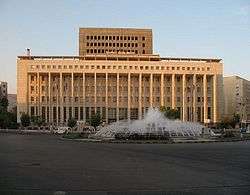Central Bank of Syria
The Central Bank of Syria (CBS) (Arabic: مصرف سورية المركزي, Masrif Suriat Almarkazi) is the central bank of Syria. The bank was established in 1953 and started operations in 1956. Its headquarters are in Damascus, with 11 branches in the provincial capitals.[2] The objective of the bank is "to foster the stability, integrity and efficiency of the nation’s financial and payment systems so as to promote optimal macro economic performance".[3]
 Central Bank of Syria on the Sabaa Bahrat Square in Damascus | |
| Headquarters | Damascus, Syria |
|---|---|
| Established | 1953 |
| Ownership | 100% state ownership[1] |
| Governor | Hazem Karfoul |
| Central bank of | Syria |
| Currency | Syrian Pound SYP (ISO 4217) |
| Bank rate | 0٪ |
| Interest on reserves | 6.00% |
| Website | http://cb.gov.sy/en |
The CBS issues Syria's currency, the Syrian pound and sets the intervention price in the foreign currency market for the Syrian pound on a daily basis. The CBS exercises control over all banks operating in Syria.
History
The primary legislation establishing a central bank and control of the banking system was passed in 1953, but the Central Bank did not commence operations until 1956. Its functions included issuing notes, controlling the money supply, acting as fiscal agent for the government, and controlling credit and commercial banks.[4]
After the 1956 Suez War, French and British banking interests were sequestered as enemy assets. In 1958, and after the union with Egypt, the state began to Arabize the commercial banking system and in 1961 implemented a policy of limited nationalization.[4]
In 1966, the state achieved complete ownership of commercial banking by merging all existing commercial banks into a single consolidated Commercial Bank of Syria. The government also created specialized banks to promote economic development.[4]
International sanctions
The US, Canada, EU, Arab League and Turkey have all imposed sanctions on the Central Bank because of the Syrian Civil War.[5][6][7] In the case of the US, sanctions had already been in place against the Central Bank since May 2004 under Section 311 of the Patriot Act, with the Bank being accused of money laundering.[8] The sanctions have shut Syria out of the global financial system. To circumvent the sanctions, Syrians effect foreign transactions through banks in neighbouring countries, especially Lebanon,[9] but making them vulnerable to economic disruptions in those countries.
The Central Bank has actively been trying to undermine these various sanctions, with bank officials meeting friendly institutions such as Gazprombank executives in Moscow in March 2012.[10] The Bank has taken an increasingly clandestine role in the domestic private sector as the country's failing economy has deterred foreign investment.[11]
Gold reserves
In April 2012, Reuters reported that since the outbreak of the Syrian Civil War in 2011, Syria's gold reserves have been cut in half from the pre-civil war level of about $17 billion, with the Syrian government using the reserves to cope with international sanctions.[12] The Governor of the Central Bank Adib Mayalah has sought to deny these reports.[13] This is similar to how the Syrian government is using its foreign reserves to meet the demands of a budget deficit which has greatly increased to about US$6.7 billion.[14]
Attacks on bank
Since the start of the Syrian Civil War, the Central Bank building was attacked three times: in April 2012 a rocket-propelled grenade was fired at the building; in April 2013 it was affected by a car bombing nearby; and in October 2013 it was hit by mortar shells.[15]
Governors
- (1956–1961) Izzat Traboulsi
- (1961–1963) Hosni Al Sawaf
- (1963–1963) Nourallah Nourallah
- (1963–1970) Adnan Al Farra
- (1971–1978) Nasouh Al Dakkak
- (1978–1984) Rifaat Al Akkad
- (1984–1987) Hisham Mutawalli
- (1987–1995) Mohammad Al Sharif
- (1995–2004) Mohammad Bashar Kabbarah
- (2005–2016) Adib Mayaleh
- (2016-2018) Duraid Durgam
- (currently) Hazem Karfoul
See also
References
- https://d-nb.info/1138787981/34
- "CBS's Branches in Syria". Archived from the original on 4 October 2006. Retrieved 11 October 2013.
- "Central Bank of Syria official website". Archived from the original on 25 September 2013. Retrieved 11 October 2013.
- Banking and Monetary Policy
- Cutler, David (2011-11-28). "Factbox: Sanctions imposed on Syria". Reuters.
- "Turkey Slaps Economic Sanctions on Syria". Fox News. 2011-11-30.
- "Canadian Sanctions | Foundation for Defense of Democracies". Defenddemocracy.org. Archived from the original on 2018-08-06. Retrieved 2013-02-04.
- "US trade and financial sanctions against Syria". Embassy of the United States Damascus. Retrieved 2012-08-24.
- "Lebanon crisis wreaks havoc on Syria's war-torn economy". Reuters. 29 November 2019.
- "Syria's Russian Connection". Wall Street Journal. 2012-08-14. Retrieved 2012-08-25.
- "Syria backs down over import ban". Financial Times. 2011-11-04. Retrieved 2012-08-25.
- "Syria selling gold reserves as sanctions bite: sources". Reuters. 2012-04-18. Retrieved 2012-08-25.
- "Skepticism overshadows Syria's gold reserves". Xinhua. 2012-04-20. Retrieved 2012-08-25.
- "Syria reverts to socialist economic policies to ease tension". Reuters. 2012-07-04. Retrieved 2012-10-27.
- "Mortars hit Syria central bank in Damascus". NOW. AFP. 9 October 2013. Retrieved 11 October 2013.
External links
| Wikimedia Commons has media related to Central Bank of Syria. |
- Official website (in Arabic and English)